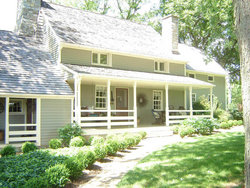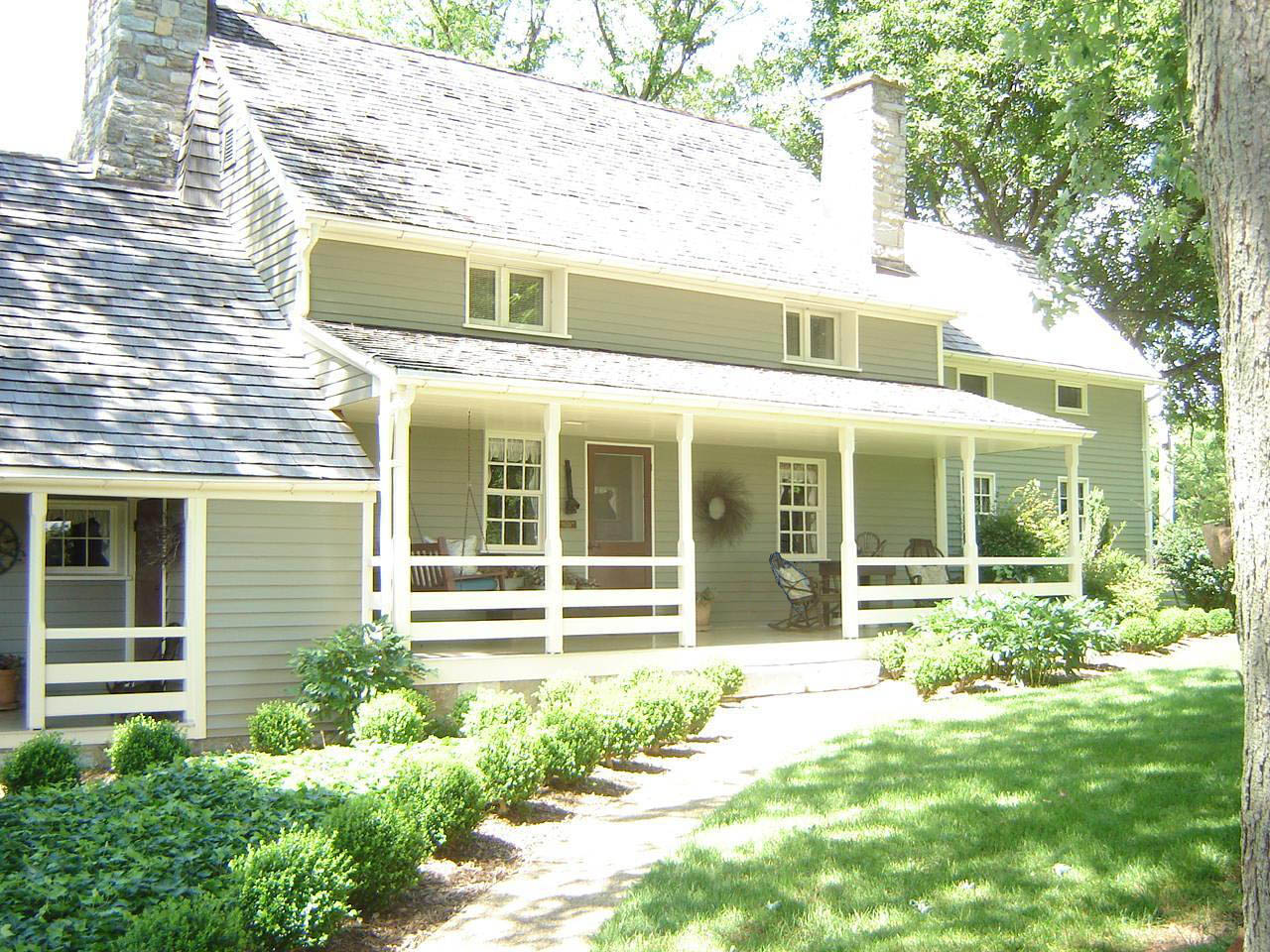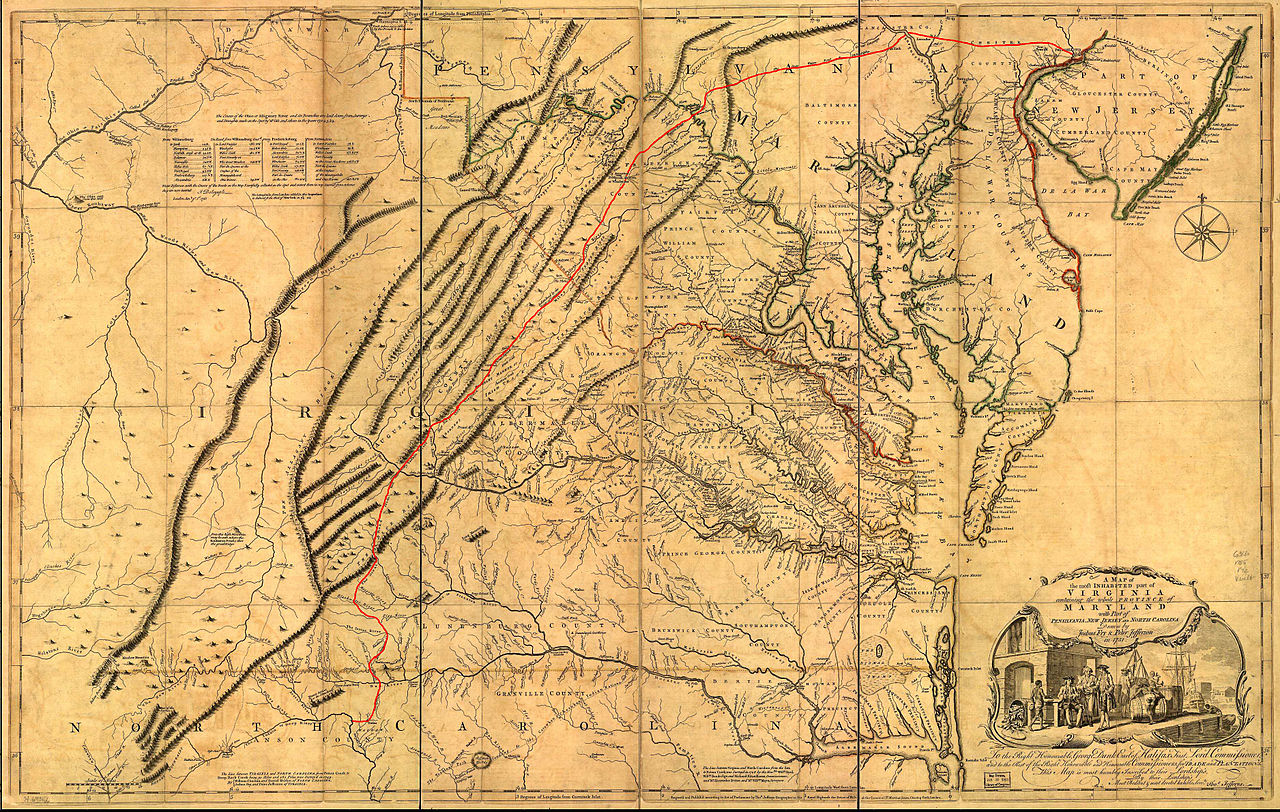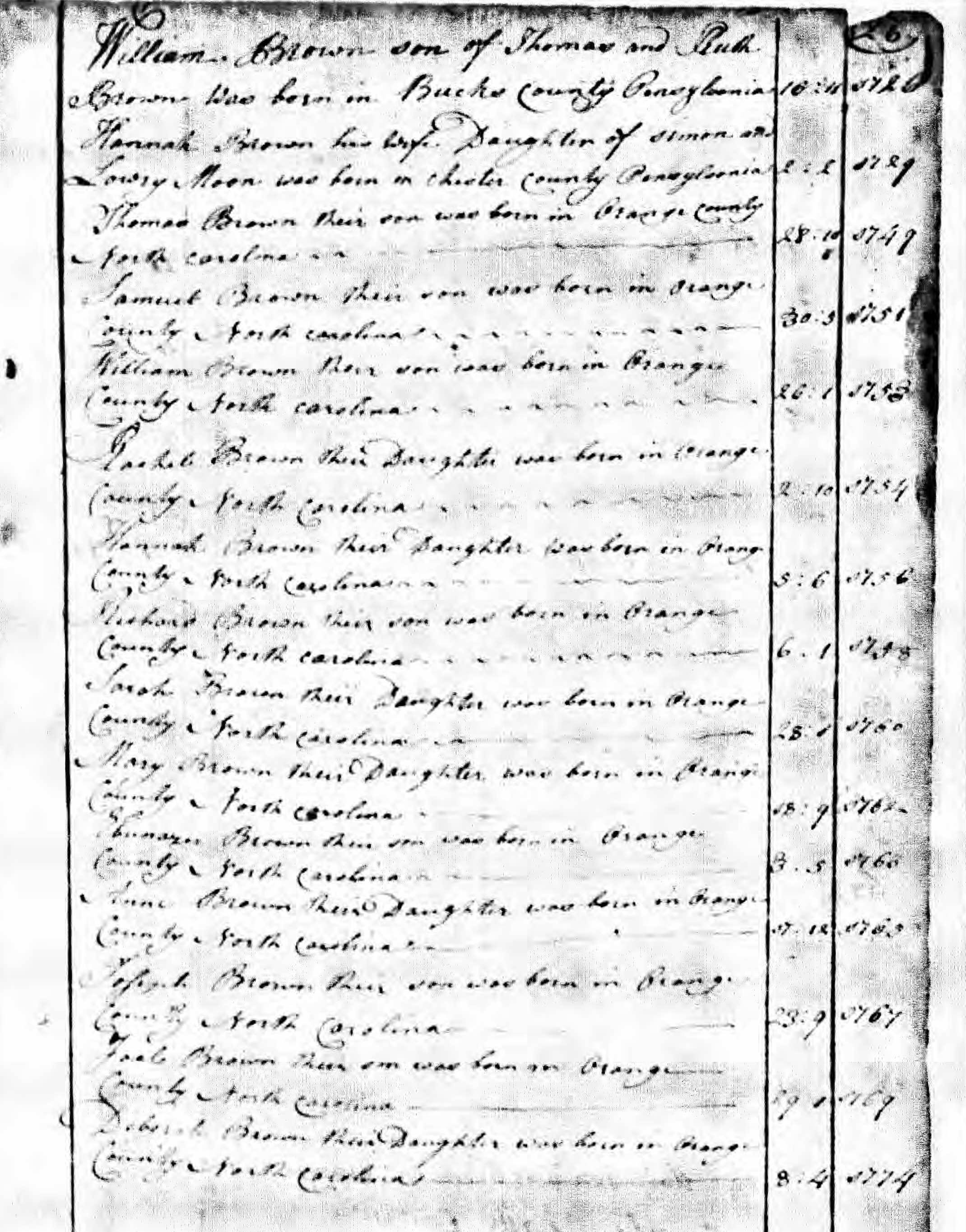William was born in 1726 in Bucks County, PA, the eldest son of Thomas and Ruth (Large) Brown. His family belonged to the Buckingham Monthly Meeting of the Society of Friends (Quakers), so he was presumably born in Buckingham Township. In May, 1741, he moved with his family to the new Quaker settlement called Hopewell in the Shenandoah Valley of northern Virginia. No doubt they traveled the Great Wagon Road, which went from Philadelphia to central North Carolina, crossing Virginia through the Shenandoah Valley. It was an Indian trail that was traversable by wagons only as far south as Winchester, in Frederick County. William’s father Thomas bought land just north of Winchester, near what is now Arden in Berkeley County, West Virginia. There they built a fine log house that is today on the national register of historic places. They started an orchard and nursery business that introduced orchardry to the region, still one of its major industries. The family farm was quite successful and expanded to over 1200 acres.
The Brown farm adjoined a farm belonging to the Simon Moon family, who were also Quakers. The families were close, and three of the Brown children married three of the Moon children. William Brown and Hannah Moon were married there on February 4, 1748. The minutes of Hopewell Monthly Meeting for that day say, “The friends appointed to see Wm Brown & Hannah Moon’s marriage accomplished report that it was decently consummated.”
Early in 1750, William’s father Thomas passed away, leaving Thomas 200 acres. He evidently sold the land, for around that same time he and Hannah moved to central North Carolina, to the new Quaker settlement called “Cane Creek,” in what is now Alamance County but was then part of Orange County. They were founding members of the Cane Creek Monthly Meeting of the Society of Friends, which formed in 1751. They were blessed with thirteen children, all of whom grew up and married. All but one, Thomas, moved further west to Guilford and Yadkin Counties, or on to Indiana. William remained in the Cane Creek community, where he died in February, 1800. His grave was no doubt marked with an uninscribed field stone, as was the custom in those days among Quakers.
Last Will and Testament of William Brown
I, William Brown of Orange Co., of State of North Carolina, being weak of body but of perfect mind and memory, and knowing the mortality of my body, that it is appointed for all men once to die, do therefore this 19th day of 11th month in the year 1797 make and ordain this my last Will and Testament in manner following.
And as touching such worldly estate as is hath pleased the Lord to bless me with, I bequeath, and give and devise and dispose of in the following manner.
First I ordain and constitute my son Joel Brown and my friend Jacob Marshall my whole and sole Executors of the whole in trust. I allow my funeral expenses and just debts to be first paid out of my estate.
I give and bequeath to my beloved wife Hannah Brown a horse and saddle, a feather bed and furniture, a cow and a calf, and [moveable] possessions on the plantation that I now live on and sufficiently maintained thereon with the privileges of the house during her widowhood.
I give and bequeath to my daughter Deborah a feather bed and furniture, a sorrel filly that is called ??, a cow and calf, and her side saddle.
Then I allow at my wife’s consent for my possessions of lands to be sold and the money equally divided amongst my sons who are living at that time, except my son William to whom I allow ten pounds (10) less than the others, and at my wife’s consent for all my valuable estate to be sold that in or may be found upon the premises and the money to be equally divided amongst my daughters who are living at that time. I give two-tenths to each of my children … two shillings.
In witness and testimony where of I, William Brown set my hand and affixed my seal the day and year above written.
William Brown (Seal)
Signed and sealed in the presence of
William Brown
Jacob Brown
William Stout
Children of Hannah and William Brown, as listed in the Encyclopedia of American Quaker Genealogy, Volume 1, by William Wade Hinshaw:
Thomas, born 10-28-1749
Samuel, born 5-30-1751
William, born 1-26-1753
Rachel, born 10-2-1754
Hannah, born 6-5-1756
Richard, born 1-6-1758
Sarah, born 1-28-1760
Mary, born 9-18-1762
Ebunazar, born 5-3-1763
Anne, born 12-17-1765
Joseph, born 9-23-1767
Joel, born 1-29-1769
Deborah, born 4-8-1774
William was born in 1726 in Bucks County, PA, the eldest son of Thomas and Ruth (Large) Brown. His family belonged to the Buckingham Monthly Meeting of the Society of Friends (Quakers), so he was presumably born in Buckingham Township. In May, 1741, he moved with his family to the new Quaker settlement called Hopewell in the Shenandoah Valley of northern Virginia. No doubt they traveled the Great Wagon Road, which went from Philadelphia to central North Carolina, crossing Virginia through the Shenandoah Valley. It was an Indian trail that was traversable by wagons only as far south as Winchester, in Frederick County. William’s father Thomas bought land just north of Winchester, near what is now Arden in Berkeley County, West Virginia. There they built a fine log house that is today on the national register of historic places. They started an orchard and nursery business that introduced orchardry to the region, still one of its major industries. The family farm was quite successful and expanded to over 1200 acres.
The Brown farm adjoined a farm belonging to the Simon Moon family, who were also Quakers. The families were close, and three of the Brown children married three of the Moon children. William Brown and Hannah Moon were married there on February 4, 1748. The minutes of Hopewell Monthly Meeting for that day say, “The friends appointed to see Wm Brown & Hannah Moon’s marriage accomplished report that it was decently consummated.”
Early in 1750, William’s father Thomas passed away, leaving Thomas 200 acres. He evidently sold the land, for around that same time he and Hannah moved to central North Carolina, to the new Quaker settlement called “Cane Creek,” in what is now Alamance County but was then part of Orange County. They were founding members of the Cane Creek Monthly Meeting of the Society of Friends, which formed in 1751. They were blessed with thirteen children, all of whom grew up and married. All but one, Thomas, moved further west to Guilford and Yadkin Counties, or on to Indiana. William remained in the Cane Creek community, where he died in February, 1800. His grave was no doubt marked with an uninscribed field stone, as was the custom in those days among Quakers.
Last Will and Testament of William Brown
I, William Brown of Orange Co., of State of North Carolina, being weak of body but of perfect mind and memory, and knowing the mortality of my body, that it is appointed for all men once to die, do therefore this 19th day of 11th month in the year 1797 make and ordain this my last Will and Testament in manner following.
And as touching such worldly estate as is hath pleased the Lord to bless me with, I bequeath, and give and devise and dispose of in the following manner.
First I ordain and constitute my son Joel Brown and my friend Jacob Marshall my whole and sole Executors of the whole in trust. I allow my funeral expenses and just debts to be first paid out of my estate.
I give and bequeath to my beloved wife Hannah Brown a horse and saddle, a feather bed and furniture, a cow and a calf, and [moveable] possessions on the plantation that I now live on and sufficiently maintained thereon with the privileges of the house during her widowhood.
I give and bequeath to my daughter Deborah a feather bed and furniture, a sorrel filly that is called ??, a cow and calf, and her side saddle.
Then I allow at my wife’s consent for my possessions of lands to be sold and the money equally divided amongst my sons who are living at that time, except my son William to whom I allow ten pounds (10) less than the others, and at my wife’s consent for all my valuable estate to be sold that in or may be found upon the premises and the money to be equally divided amongst my daughters who are living at that time. I give two-tenths to each of my children … two shillings.
In witness and testimony where of I, William Brown set my hand and affixed my seal the day and year above written.
William Brown (Seal)
Signed and sealed in the presence of
William Brown
Jacob Brown
William Stout
Children of Hannah and William Brown, as listed in the Encyclopedia of American Quaker Genealogy, Volume 1, by William Wade Hinshaw:
Thomas, born 10-28-1749
Samuel, born 5-30-1751
William, born 1-26-1753
Rachel, born 10-2-1754
Hannah, born 6-5-1756
Richard, born 1-6-1758
Sarah, born 1-28-1760
Mary, born 9-18-1762
Ebunazar, born 5-3-1763
Anne, born 12-17-1765
Joseph, born 9-23-1767
Joel, born 1-29-1769
Deborah, born 4-8-1774
Gravesite Details
There is no identifiable headstone. Quaker markers at this time were often just field stones with no inscription or just an initial, like those in the cemetery photo.















